Business Law & Ethics: Parliamentary Sovereignty and EU Essay
VerifiedAdded on 2022/11/25
|7
|1839
|188
Essay
AI Summary
This essay provides a comprehensive analysis of parliamentary sovereignty, a foundational principle of the British constitution. It begins with an introduction to the concept, highlighting its unwritten nature and significance. The main body delves into the meaning of parliamentary sovereignty, emphasizing the parliament's supreme legislative authority and its limitations. The essay explores the historical context, tracing the evolution of sovereignty from the monarchy to parliament. It discusses A.V. Dicey's articulation of parliamentary sovereignty and examines the constraints imposed by the UK's membership in the European Union, including the impact of European law and the supremacy of EU legislation. The essay then analyzes the effects of Brexit, focusing on its implications for parliamentary sovereignty, the UK economy, and trade. It considers the economic consequences, such as the depreciation of the pound and increased trade costs, and evaluates the arguments for and against leaving the EU, including the question of national autonomy. The essay concludes by summarizing the key findings and emphasizing the lasting impact of Brexit on the UK's legal and economic landscape.

Business Law & Ethics
Paraphrase This Document
Need a fresh take? Get an instant paraphrase of this document with our AI Paraphraser

Table of Contents
INTRODUCTION...........................................................................................................................3
MAIN BODY..................................................................................................................................3
CONCLUSION................................................................................................................................6
REFERENCES................................................................................................................................7
INTRODUCTION...........................................................................................................................3
MAIN BODY..................................................................................................................................3
CONCLUSION................................................................................................................................6
REFERENCES................................................................................................................................7
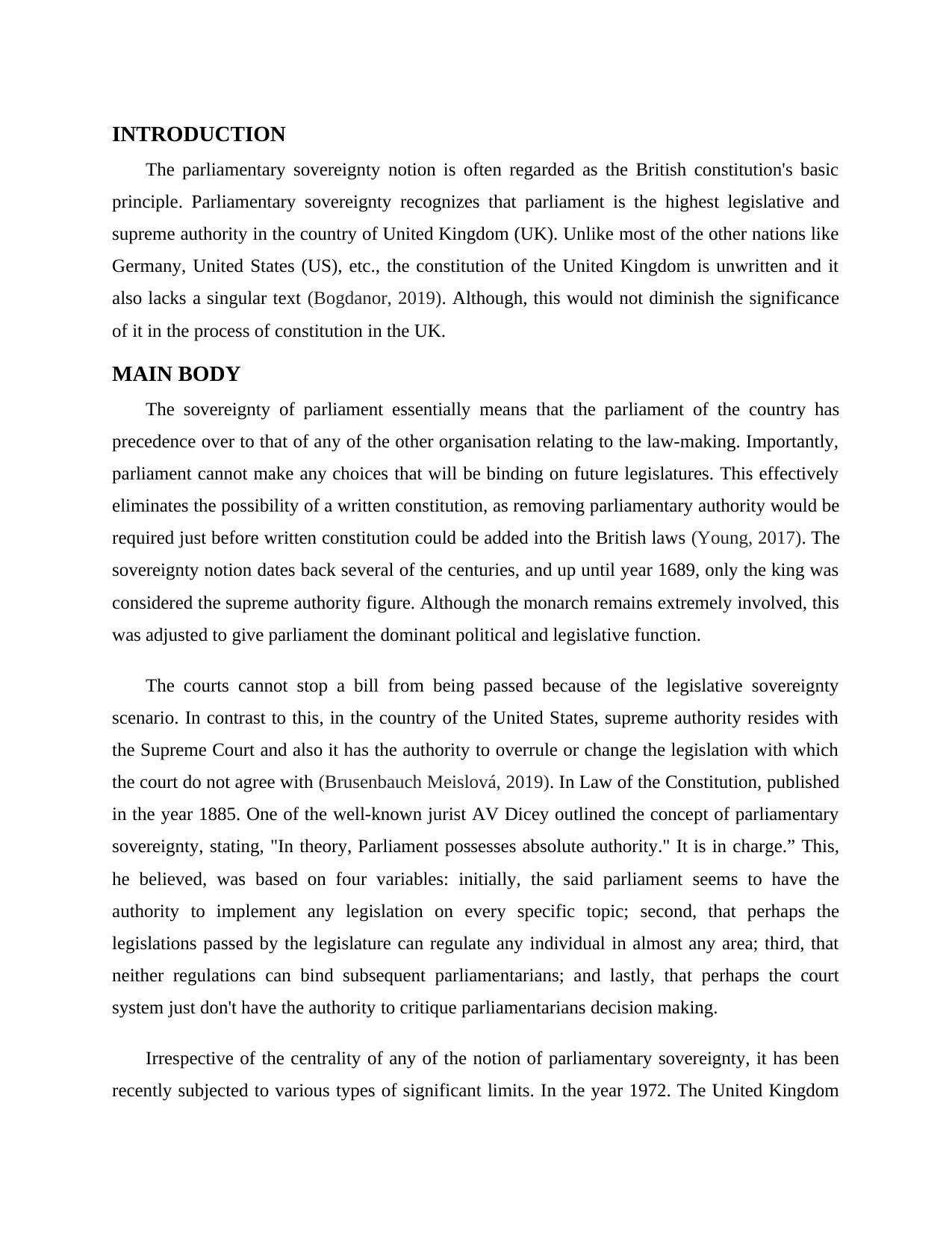
INTRODUCTION
The parliamentary sovereignty notion is often regarded as the British constitution's basic
principle. Parliamentary sovereignty recognizes that parliament is the highest legislative and
supreme authority in the country of United Kingdom (UK). Unlike most of the other nations like
Germany, United States (US), etc., the constitution of the United Kingdom is unwritten and it
also lacks a singular text (Bogdanor, 2019). Although, this would not diminish the significance
of it in the process of constitution in the UK.
MAIN BODY
The sovereignty of parliament essentially means that the parliament of the country has
precedence over to that of any of the other organisation relating to the law-making. Importantly,
parliament cannot make any choices that will be binding on future legislatures. This effectively
eliminates the possibility of a written constitution, as removing parliamentary authority would be
required just before written constitution could be added into the British laws (Young, 2017). The
sovereignty notion dates back several of the centuries, and up until year 1689, only the king was
considered the supreme authority figure. Although the monarch remains extremely involved, this
was adjusted to give parliament the dominant political and legislative function.
The courts cannot stop a bill from being passed because of the legislative sovereignty
scenario. In contrast to this, in the country of the United States, supreme authority resides with
the Supreme Court and also it has the authority to overrule or change the legislation with which
the court do not agree with (Brusenbauch Meislová, 2019). In Law of the Constitution, published
in the year 1885. One of the well-known jurist AV Dicey outlined the concept of parliamentary
sovereignty, stating, "In theory, Parliament possesses absolute authority." It is in charge.” This,
he believed, was based on four variables: initially, the said parliament seems to have the
authority to implement any legislation on every specific topic; second, that perhaps the
legislations passed by the legislature can regulate any individual in almost any area; third, that
neither regulations can bind subsequent parliamentarians; and lastly, that perhaps the court
system just don't have the authority to critique parliamentarians decision making.
Irrespective of the centrality of any of the notion of parliamentary sovereignty, it has been
recently subjected to various types of significant limits. In the year 1972. The United Kingdom
The parliamentary sovereignty notion is often regarded as the British constitution's basic
principle. Parliamentary sovereignty recognizes that parliament is the highest legislative and
supreme authority in the country of United Kingdom (UK). Unlike most of the other nations like
Germany, United States (US), etc., the constitution of the United Kingdom is unwritten and it
also lacks a singular text (Bogdanor, 2019). Although, this would not diminish the significance
of it in the process of constitution in the UK.
MAIN BODY
The sovereignty of parliament essentially means that the parliament of the country has
precedence over to that of any of the other organisation relating to the law-making. Importantly,
parliament cannot make any choices that will be binding on future legislatures. This effectively
eliminates the possibility of a written constitution, as removing parliamentary authority would be
required just before written constitution could be added into the British laws (Young, 2017). The
sovereignty notion dates back several of the centuries, and up until year 1689, only the king was
considered the supreme authority figure. Although the monarch remains extremely involved, this
was adjusted to give parliament the dominant political and legislative function.
The courts cannot stop a bill from being passed because of the legislative sovereignty
scenario. In contrast to this, in the country of the United States, supreme authority resides with
the Supreme Court and also it has the authority to overrule or change the legislation with which
the court do not agree with (Brusenbauch Meislová, 2019). In Law of the Constitution, published
in the year 1885. One of the well-known jurist AV Dicey outlined the concept of parliamentary
sovereignty, stating, "In theory, Parliament possesses absolute authority." It is in charge.” This,
he believed, was based on four variables: initially, the said parliament seems to have the
authority to implement any legislation on every specific topic; second, that perhaps the
legislations passed by the legislature can regulate any individual in almost any area; third, that
neither regulations can bind subsequent parliamentarians; and lastly, that perhaps the court
system just don't have the authority to critique parliamentarians decision making.
Irrespective of the centrality of any of the notion of parliamentary sovereignty, it has been
recently subjected to various types of significant limits. In the year 1972. The United Kingdom
⊘ This is a preview!⊘
Do you want full access?
Subscribe today to unlock all pages.

Trusted by 1+ million students worldwide
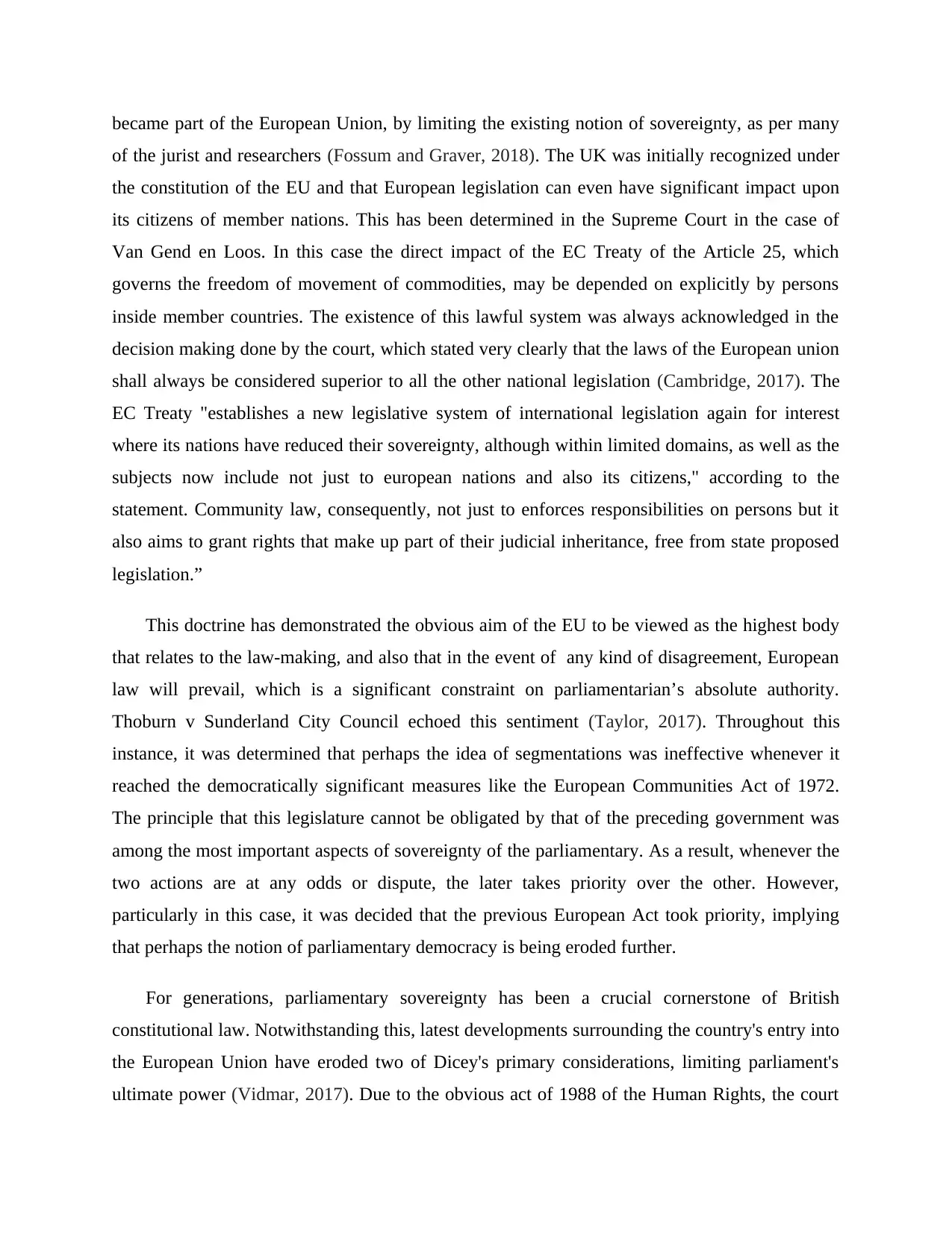
became part of the European Union, by limiting the existing notion of sovereignty, as per many
of the jurist and researchers (Fossum and Graver, 2018). The UK was initially recognized under
the constitution of the EU and that European legislation can even have significant impact upon
its citizens of member nations. This has been determined in the Supreme Court in the case of
Van Gend en Loos. In this case the direct impact of the EC Treaty of the Article 25, which
governs the freedom of movement of commodities, may be depended on explicitly by persons
inside member countries. The existence of this lawful system was always acknowledged in the
decision making done by the court, which stated very clearly that the laws of the European union
shall always be considered superior to all the other national legislation (Cambridge, 2017). The
EC Treaty "establishes a new legislative system of international legislation again for interest
where its nations have reduced their sovereignty, although within limited domains, as well as the
subjects now include not just to european nations and also its citizens," according to the
statement. Community law, consequently, not just to enforces responsibilities on persons but it
also aims to grant rights that make up part of their judicial inheritance, free from state proposed
legislation.”
This doctrine has demonstrated the obvious aim of the EU to be viewed as the highest body
that relates to the law-making, and also that in the event of any kind of disagreement, European
law will prevail, which is a significant constraint on parliamentarian’s absolute authority.
Thoburn v Sunderland City Council echoed this sentiment (Taylor, 2017). Throughout this
instance, it was determined that perhaps the idea of segmentations was ineffective whenever it
reached the democratically significant measures like the European Communities Act of 1972.
The principle that this legislature cannot be obligated by that of the preceding government was
among the most important aspects of sovereignty of the parliamentary. As a result, whenever the
two actions are at any odds or dispute, the later takes priority over the other. However,
particularly in this case, it was decided that the previous European Act took priority, implying
that perhaps the notion of parliamentary democracy is being eroded further.
For generations, parliamentary sovereignty has been a crucial cornerstone of British
constitutional law. Notwithstanding this, latest developments surrounding the country's entry into
the European Union have eroded two of Dicey's primary considerations, limiting parliament's
ultimate power (Vidmar, 2017). Due to the obvious act of 1988 of the Human Rights, the court
of the jurist and researchers (Fossum and Graver, 2018). The UK was initially recognized under
the constitution of the EU and that European legislation can even have significant impact upon
its citizens of member nations. This has been determined in the Supreme Court in the case of
Van Gend en Loos. In this case the direct impact of the EC Treaty of the Article 25, which
governs the freedom of movement of commodities, may be depended on explicitly by persons
inside member countries. The existence of this lawful system was always acknowledged in the
decision making done by the court, which stated very clearly that the laws of the European union
shall always be considered superior to all the other national legislation (Cambridge, 2017). The
EC Treaty "establishes a new legislative system of international legislation again for interest
where its nations have reduced their sovereignty, although within limited domains, as well as the
subjects now include not just to european nations and also its citizens," according to the
statement. Community law, consequently, not just to enforces responsibilities on persons but it
also aims to grant rights that make up part of their judicial inheritance, free from state proposed
legislation.”
This doctrine has demonstrated the obvious aim of the EU to be viewed as the highest body
that relates to the law-making, and also that in the event of any kind of disagreement, European
law will prevail, which is a significant constraint on parliamentarian’s absolute authority.
Thoburn v Sunderland City Council echoed this sentiment (Taylor, 2017). Throughout this
instance, it was determined that perhaps the idea of segmentations was ineffective whenever it
reached the democratically significant measures like the European Communities Act of 1972.
The principle that this legislature cannot be obligated by that of the preceding government was
among the most important aspects of sovereignty of the parliamentary. As a result, whenever the
two actions are at any odds or dispute, the later takes priority over the other. However,
particularly in this case, it was decided that the previous European Act took priority, implying
that perhaps the notion of parliamentary democracy is being eroded further.
For generations, parliamentary sovereignty has been a crucial cornerstone of British
constitutional law. Notwithstanding this, latest developments surrounding the country's entry into
the European Union have eroded two of Dicey's primary considerations, limiting parliament's
ultimate power (Vidmar, 2017). Due to the obvious act of 1988 of the Human Rights, the court
Paraphrase This Document
Need a fresh take? Get an instant paraphrase of this document with our AI Paraphraser
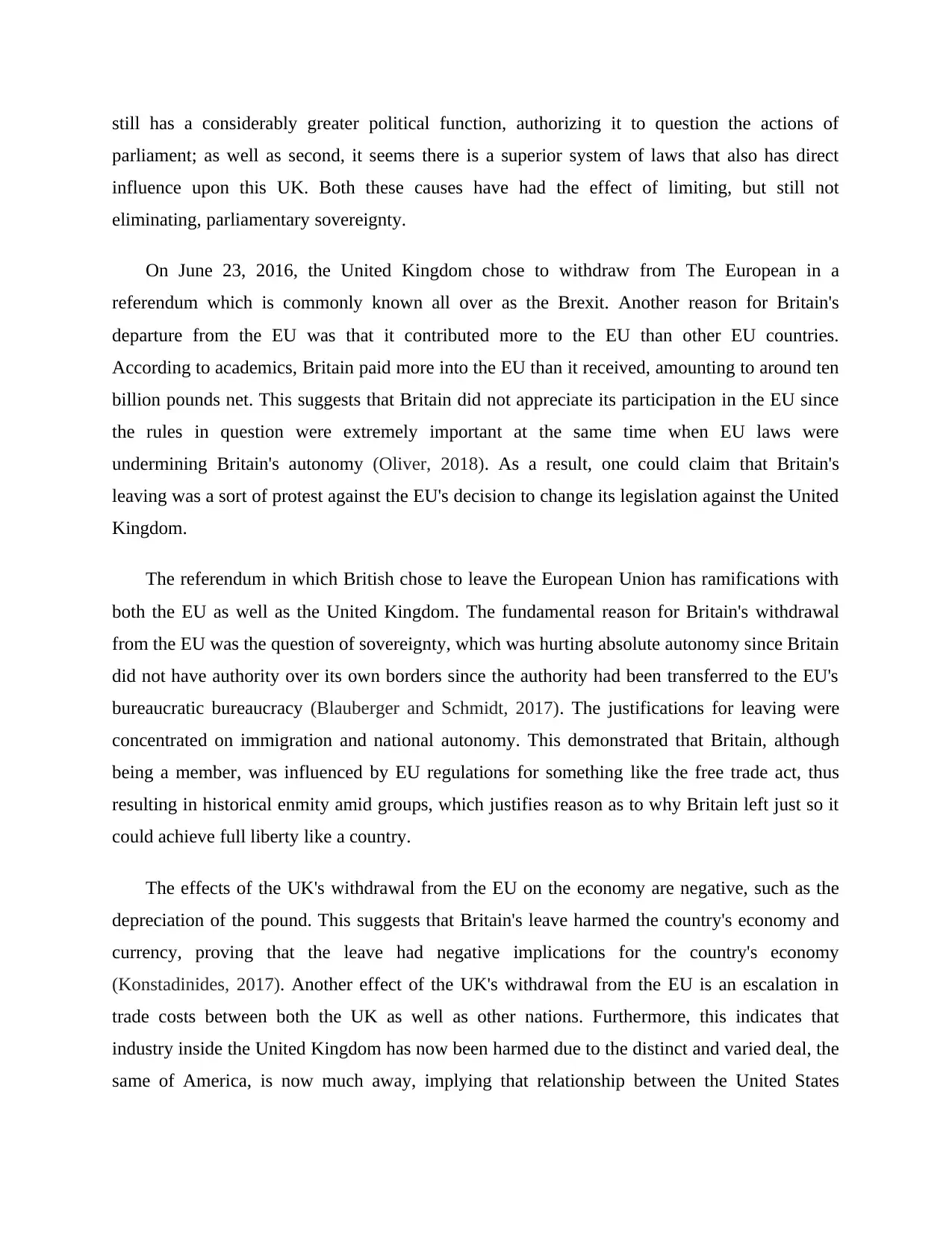
still has a considerably greater political function, authorizing it to question the actions of
parliament; as well as second, it seems there is a superior system of laws that also has direct
influence upon this UK. Both these causes have had the effect of limiting, but still not
eliminating, parliamentary sovereignty.
On June 23, 2016, the United Kingdom chose to withdraw from The European in a
referendum which is commonly known all over as the Brexit. Another reason for Britain's
departure from the EU was that it contributed more to the EU than other EU countries.
According to academics, Britain paid more into the EU than it received, amounting to around ten
billion pounds net. This suggests that Britain did not appreciate its participation in the EU since
the rules in question were extremely important at the same time when EU laws were
undermining Britain's autonomy (Oliver, 2018). As a result, one could claim that Britain's
leaving was a sort of protest against the EU's decision to change its legislation against the United
Kingdom.
The referendum in which British chose to leave the European Union has ramifications with
both the EU as well as the United Kingdom. The fundamental reason for Britain's withdrawal
from the EU was the question of sovereignty, which was hurting absolute autonomy since Britain
did not have authority over its own borders since the authority had been transferred to the EU's
bureaucratic bureaucracy (Blauberger and Schmidt, 2017). The justifications for leaving were
concentrated on immigration and national autonomy. This demonstrated that Britain, although
being a member, was influenced by EU regulations for something like the free trade act, thus
resulting in historical enmity amid groups, which justifies reason as to why Britain left just so it
could achieve full liberty like a country.
The effects of the UK's withdrawal from the EU on the economy are negative, such as the
depreciation of the pound. This suggests that Britain's leave harmed the country's economy and
currency, proving that the leave had negative implications for the country's economy
(Konstadinides, 2017). Another effect of the UK's withdrawal from the EU is an escalation in
trade costs between both the UK as well as other nations. Furthermore, this indicates that
industry inside the United Kingdom has now been harmed due to the distinct and varied deal, the
same of America, is now much away, implying that relationship between the United States
parliament; as well as second, it seems there is a superior system of laws that also has direct
influence upon this UK. Both these causes have had the effect of limiting, but still not
eliminating, parliamentary sovereignty.
On June 23, 2016, the United Kingdom chose to withdraw from The European in a
referendum which is commonly known all over as the Brexit. Another reason for Britain's
departure from the EU was that it contributed more to the EU than other EU countries.
According to academics, Britain paid more into the EU than it received, amounting to around ten
billion pounds net. This suggests that Britain did not appreciate its participation in the EU since
the rules in question were extremely important at the same time when EU laws were
undermining Britain's autonomy (Oliver, 2018). As a result, one could claim that Britain's
leaving was a sort of protest against the EU's decision to change its legislation against the United
Kingdom.
The referendum in which British chose to leave the European Union has ramifications with
both the EU as well as the United Kingdom. The fundamental reason for Britain's withdrawal
from the EU was the question of sovereignty, which was hurting absolute autonomy since Britain
did not have authority over its own borders since the authority had been transferred to the EU's
bureaucratic bureaucracy (Blauberger and Schmidt, 2017). The justifications for leaving were
concentrated on immigration and national autonomy. This demonstrated that Britain, although
being a member, was influenced by EU regulations for something like the free trade act, thus
resulting in historical enmity amid groups, which justifies reason as to why Britain left just so it
could achieve full liberty like a country.
The effects of the UK's withdrawal from the EU on the economy are negative, such as the
depreciation of the pound. This suggests that Britain's leave harmed the country's economy and
currency, proving that the leave had negative implications for the country's economy
(Konstadinides, 2017). Another effect of the UK's withdrawal from the EU is an escalation in
trade costs between both the UK as well as other nations. Furthermore, this indicates that
industry inside the United Kingdom has now been harmed due to the distinct and varied deal, the
same of America, is now much away, implying that relationship between the United States
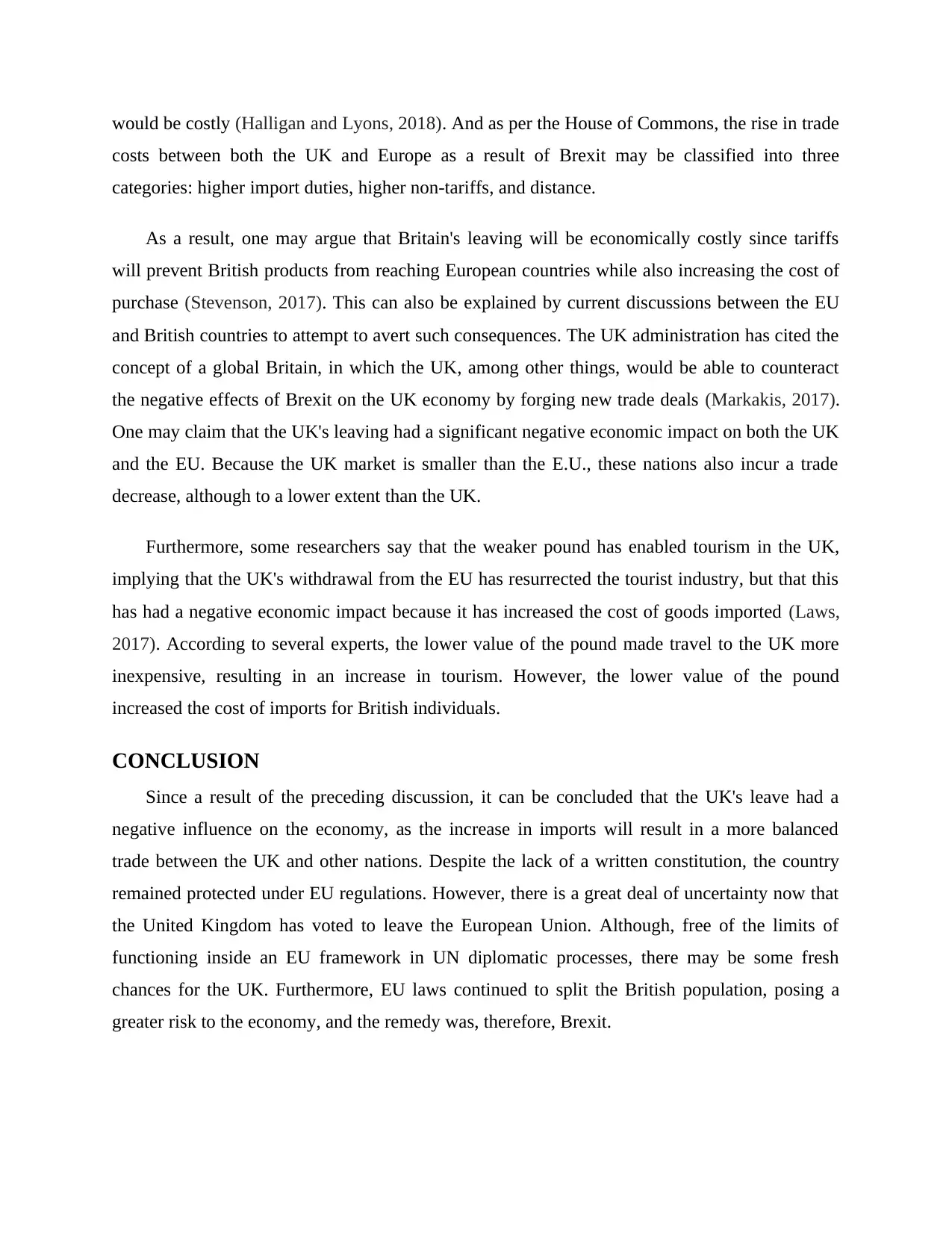
would be costly (Halligan and Lyons, 2018). And as per the House of Commons, the rise in trade
costs between both the UK and Europe as a result of Brexit may be classified into three
categories: higher import duties, higher non-tariffs, and distance.
As a result, one may argue that Britain's leaving will be economically costly since tariffs
will prevent British products from reaching European countries while also increasing the cost of
purchase (Stevenson, 2017). This can also be explained by current discussions between the EU
and British countries to attempt to avert such consequences. The UK administration has cited the
concept of a global Britain, in which the UK, among other things, would be able to counteract
the negative effects of Brexit on the UK economy by forging new trade deals (Markakis, 2017).
One may claim that the UK's leaving had a significant negative economic impact on both the UK
and the EU. Because the UK market is smaller than the E.U., these nations also incur a trade
decrease, although to a lower extent than the UK.
Furthermore, some researchers say that the weaker pound has enabled tourism in the UK,
implying that the UK's withdrawal from the EU has resurrected the tourist industry, but that this
has had a negative economic impact because it has increased the cost of goods imported (Laws,
2017). According to several experts, the lower value of the pound made travel to the UK more
inexpensive, resulting in an increase in tourism. However, the lower value of the pound
increased the cost of imports for British individuals.
CONCLUSION
Since a result of the preceding discussion, it can be concluded that the UK's leave had a
negative influence on the economy, as the increase in imports will result in a more balanced
trade between the UK and other nations. Despite the lack of a written constitution, the country
remained protected under EU regulations. However, there is a great deal of uncertainty now that
the United Kingdom has voted to leave the European Union. Although, free of the limits of
functioning inside an EU framework in UN diplomatic processes, there may be some fresh
chances for the UK. Furthermore, EU laws continued to split the British population, posing a
greater risk to the economy, and the remedy was, therefore, Brexit.
costs between both the UK and Europe as a result of Brexit may be classified into three
categories: higher import duties, higher non-tariffs, and distance.
As a result, one may argue that Britain's leaving will be economically costly since tariffs
will prevent British products from reaching European countries while also increasing the cost of
purchase (Stevenson, 2017). This can also be explained by current discussions between the EU
and British countries to attempt to avert such consequences. The UK administration has cited the
concept of a global Britain, in which the UK, among other things, would be able to counteract
the negative effects of Brexit on the UK economy by forging new trade deals (Markakis, 2017).
One may claim that the UK's leaving had a significant negative economic impact on both the UK
and the EU. Because the UK market is smaller than the E.U., these nations also incur a trade
decrease, although to a lower extent than the UK.
Furthermore, some researchers say that the weaker pound has enabled tourism in the UK,
implying that the UK's withdrawal from the EU has resurrected the tourist industry, but that this
has had a negative economic impact because it has increased the cost of goods imported (Laws,
2017). According to several experts, the lower value of the pound made travel to the UK more
inexpensive, resulting in an increase in tourism. However, the lower value of the pound
increased the cost of imports for British individuals.
CONCLUSION
Since a result of the preceding discussion, it can be concluded that the UK's leave had a
negative influence on the economy, as the increase in imports will result in a more balanced
trade between the UK and other nations. Despite the lack of a written constitution, the country
remained protected under EU regulations. However, there is a great deal of uncertainty now that
the United Kingdom has voted to leave the European Union. Although, free of the limits of
functioning inside an EU framework in UN diplomatic processes, there may be some fresh
chances for the UK. Furthermore, EU laws continued to split the British population, posing a
greater risk to the economy, and the remedy was, therefore, Brexit.
⊘ This is a preview!⊘
Do you want full access?
Subscribe today to unlock all pages.

Trusted by 1+ million students worldwide
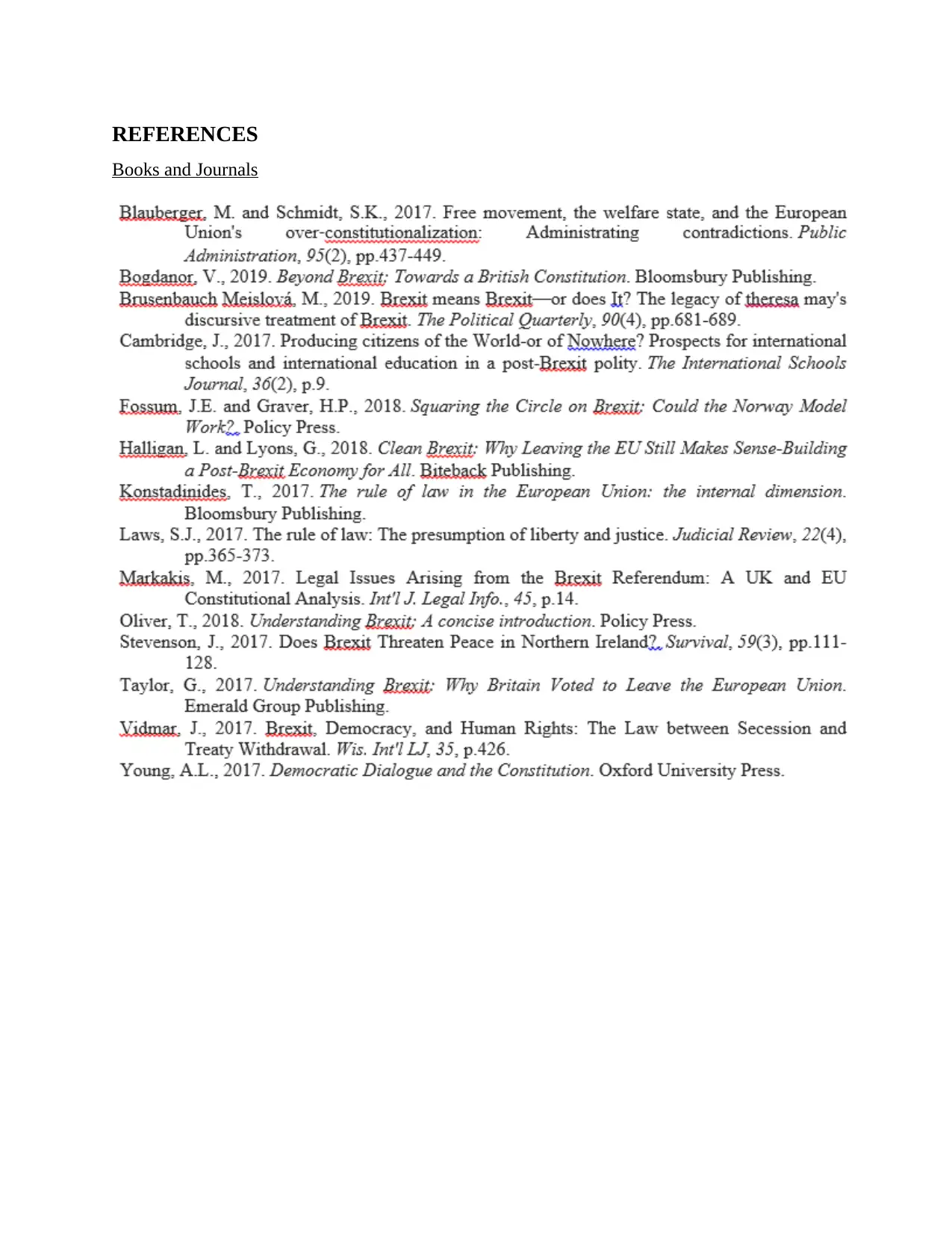
REFERENCES
Books and Journals
Books and Journals
1 out of 7
Related Documents
Your All-in-One AI-Powered Toolkit for Academic Success.
+13062052269
info@desklib.com
Available 24*7 on WhatsApp / Email
![[object Object]](/_next/static/media/star-bottom.7253800d.svg)
Unlock your academic potential
Copyright © 2020–2026 A2Z Services. All Rights Reserved. Developed and managed by ZUCOL.


![Business Law: Exploring the UK Constitution - [University Name] Essay](/_next/image/?url=https%3A%2F%2Fdesklib.com%2Fmedia%2Fuk-constitution-written-unwritten_page_2.jpg&w=256&q=75)
